Learn how to make digestive bitters easily to promote healthy digestion, plus 3 ways to use them in salad, tinctures, or infusions!
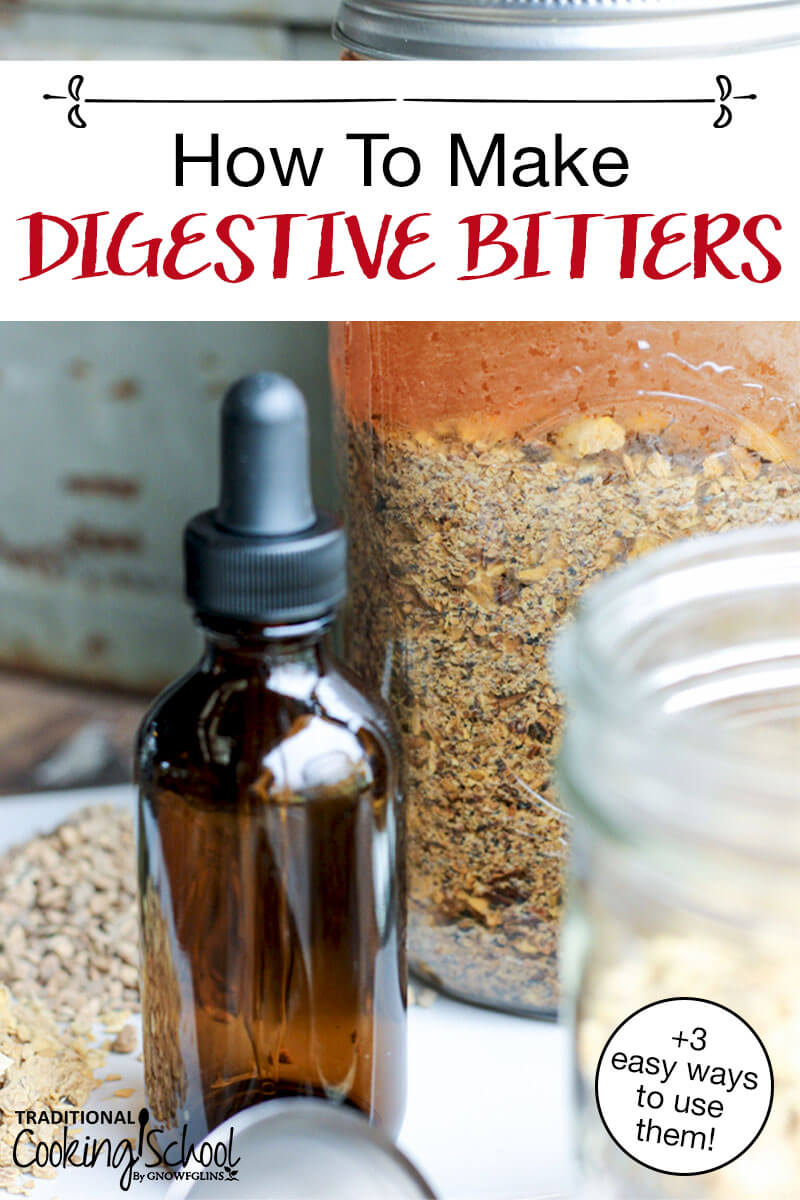
Are you experiencing tummy troubles? Sluggish digestion? Trouble with gas, burping, or bloating?
Your body may need digestive bitters to support your digestion!
Traditional bitters are a centuries-old remedy used to stimulate digestive organs and promote overall good health (source and source).
What are digestive bitters?
Bitters are a tincture made of dried herbs and alcohol. The herbs aid digestion and, in so doing, make a meal’s nutrients more accessible.
The first digestive bitters are attributed to a Swiss physician and alchemist of the 16th century, named Phillipus Paracelus. He used them for a variety of illnesses.
In 1824, a German physician, Dr. Johann Gottlieb Benjamin Siegert, in Venezuela, used bitters to treat malaria, sea sickness, and stomach maladies.
Bitters have been studied extensively since that time. Bitters prevent indigestion, heartburn, gas, bloating, and many other digestive complaints.
How do bitters work?
Digestive bitters kickstart digestion by first stimulating the bitter taste receptors on the tongue.
Bitters also change the stomach’s pH, which stimulates the gall bladder to release bile into the duodenum (the upper part of the small intestine). Bile helps to break down fats.
Have you ever eaten a high fat meal and wanted relief? Bitters can be taken before or during these symptoms, and provide amazing and even quick relief.
The pancreas and liver are also affected by digestive bitters.
The tongue signals the pancreas, which in turn releases digestive enzymes. The liver, where bile is produced, is cleansed by its release of bile into the gall bladder.
Maybe you’ve wondered, “How do I stop acid reflux?” or “How do I cure my GERD for good?” Bitters are an effective remedy that addresses the cause of these symptoms.
Proper pH in one’s stomach signals the valve between the stomach and the esophagus to close! No more acid indigestion!
What do bitters taste like?
So… why don’t more people include bitters in their diet?
Usually people don’t include bitters in their diet because they don’t yet know about them.
But bitters are also bitter! An acquired taste! 😉
Thanks to our North American diets, our taste buds are used to sweet and salty flavors. We are less inclined to appreciate the bitter flavor or understand its value.
And yet, bitter herbs and foods are just what our bodies need to work optimally.
What if bitters are too bitter?
I know what you might be thinking… “Can I bypass the bitter flavor by taking bitters in pill form?”
Unfortunately, that won’t work.
We have to actually taste the bitter flavor to reap the digestive benefits. It’s part of the process (source).
Although bitter is an acquired taste, there are a few ways to introduce bitters into your diet:
- Start with a small amount and increase over time until you’re used to digestive bitters.
- Use bitters spray. Here’s a brand that uses orange peel and ginger, making the flavor more palatable.
- Make your own bitters (see below!), choosing herbs and flavors you enjoy.
3 Easy Ways To Use Digestive Bitters
Try adding bitters to your diet in different ways!
If a tincture is too strong, try an infusion, or eat fresh greens. While this approach does not stimulate your digestive juices to the same degree as a bitter tincture, it’s a good approach to one’s meal and certainly aids digestion to some extent.
Ready to get started?
Here are 3 easy ways to use digestive bitters! (#2 and #3 teach you how to make digestive bitters yourself!)
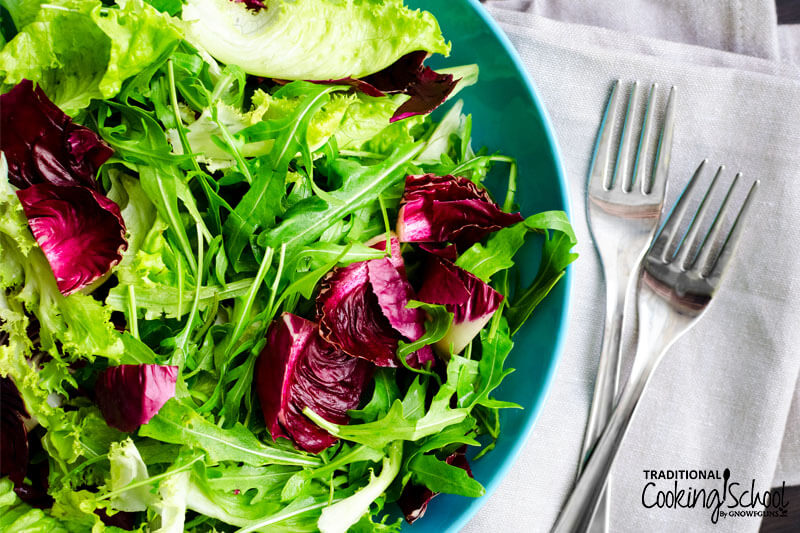
#1 — Eat bitter greens.
Chicory, radicchio, dandelion, and arugula are all bitter foods. Add these greens to your salad to kickstart your meal!
Most herbalists recommend eating bitters before your regular meal for the best benefit.
The addition of dandelion greens to your smoothie, or bitter roots such as dandelion and burdock to a stir fry, can be a great way to get more bitter flavors into your diet.
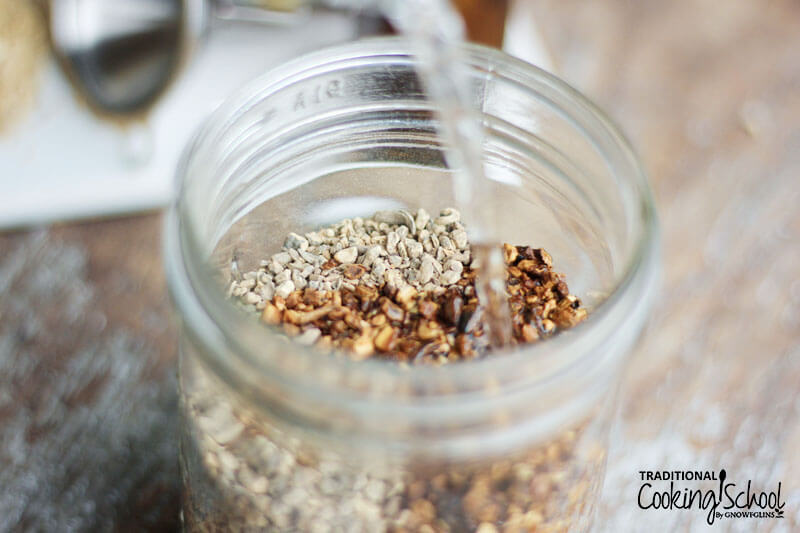
#2 — Drink a bitter infusion.
Don’t know how to make an infusion? It’s as simple as pouring boiling water over herbs!
Keep it simple: Choose well-loved herbs like peppermint and chamomile, which are also common choices for digestive bitter medleys.
Or choose a blend of herbs from the list below.
Place herbs in a cup or jar (1 tablespoon herbs per 1 cup of water). Cover in boiling water.
Let steep at least 30 minutes or overnight. Strain out the herbs.
If you prefer your infusion hot, simply reheat gently. (An infusion works best with leafy herbs or ground up roots.)
I make a large jar in the evening, let it sit overnight, then strain the herbs out the next morning and sip away at my new infusion before a meal.
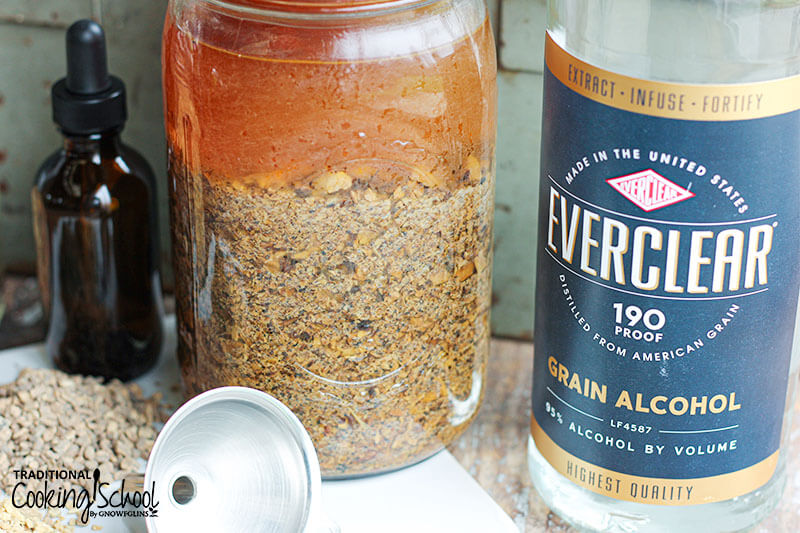
#3 — Take (and how to make!) a bitter tincture.
Yes, there are many digestive bitters tinctures available to buy… but it’s also really easy to make your own! Homemade tinctures mean you can easily adjust the formula to suit your own needs and tastes.
Many bitter herbs are considered “cold”. Cold herbs include dandelion, gentian, burdock, goldenseal, and angelica root.
Combine these cold herbs with sweet and spicy warming herbs such as ginger, clove, and cinnamon. These warm herbs also help with digestion.
To make a tincture, fill a jar 1/2 full of dry herbs or 2/3 full of fresh. Then fill to the top with vodka.
Let sit, out of direct sunlight, for about six weeks, shaking the jar from time to time.
After six weeks, strain the herbs out of the vodka using a fine sieve lined with cheesecloth. Squeeze the herbs in the cheesecloth to get out as much moisture as possible.
Store in an amber bottle with a dropper lid.
Recommended doses vary depending on the herbs you use, but 1 full dropper of tincture mixed with a little water is a common dosage for digestive bitters.
Take about 20 minutes before eating (or during a meal if you forget).
If you want a really simple recipe, you can make 2-Ingredient Digestive Bitters, which uses only gentian root and vodka. This is the recipe I make and use most often.
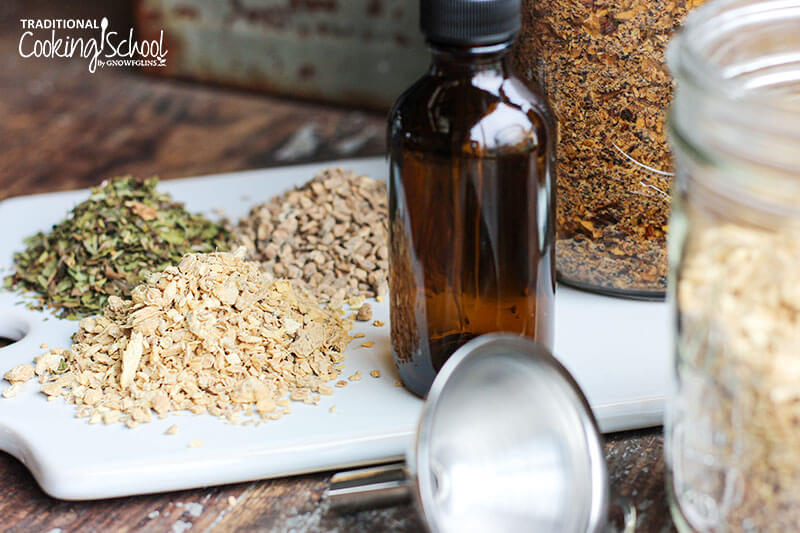
How to choose the right bitter herbs?
Most commercial bitter formulas include herbs like gentian, globe artichoke, dandelion, burdock, and yellow dock. There are many more bitter herbs to choose from, however, each with its own flavor profile and list of benefits!
For bitter medleys, I like to use a mixture of dandelion, burdock, wormwood, cardamom, and ginger. These are all herbs I regularly keep on hand, so it’s easy to make up a batch.
I also enjoy making more delicious bitters with the popular ingredients of fennel, ginger, orange rind, and peppermint.
How should you go about choosing herbs for your bitter mixture? Start with whatever you have on hand or is readily available, or look for herbs that specifically soothe and address your current health needs.
Bitter Herbs List
- Artichoke stimulates the liver, may lower cholesterol, and is an antioxidant (source).
- Barberry especially benefits the liver and gallbladder. It is a mild laxative and cleanses the system. (Source.)
- Black walnut cleanses and tones the colon, and helps prevent leaky bowel syndrome (source).
- Burdock stimulates digestive juices (especially bile) and improves appetite (source).
- Centaury strengthens the stomach, promotes digestion, and helps with diarrhea (source).
- Chamomile relaxes, relieves indigestion and inflammation, and eases flatulence (source).
- Dandelion is a diuretic and especially benefits the liver and gall bladder (source).
- Fennel relieves flatulence and stimulates digestion and appetite (source).
- Gentian root stimulates digestive juices and accelerates emptying of the stomach. It’s particularly useful for a sluggish digestive system or lack of appetite. (Source)
- Goldenseal reduces unhealthy secretions (excessive, mucous, or bloody) while increasing good secretions like bile and pancreatic enzymes. Also promotes appetite (source).
- White horehound stimulates the gallbladder (source).
- Orange peel prevents and treats heartburn, nausea, indigestion and constipation (source).
- Oregon grape root stimulates bile and digestive enzymes to optimize liver function, affecting skin health and constipation (source).
- Wormwood stimulates the digestive process and helps indigestion (source).
- Yarrow increases appetite, aids digestive cramps, bloating, and colic, and normalizes blood circulation (source).
- Yellow dock promotes flow of bile and eases constipation (source).
What about pregnancy?
Some of the herbs used to make digestive bitters are not considered safe during pregnancy. However, several herbs remain to make your own formula.
Consider burdock root, chamomile, dandelion leaf, dandelion root, ginger root and yellow dock root.
Since homemade digestive bitters are customizable, making your own works well for pregnancy. Ask your doctor to be safe.
What herbs complement bitter herbs?
- Cardamom stimulates appetite and saliva while helping to reduce flatulence.
- Cinnamon relieves nausea and prevents diarrhea.
- Clove eases nausea and flatulence and also wonderful for optimizing digestion.
- Ginger promotes gastric secretions. It is useful for flatulence, dyspepsia, and colic.
- Peppermint stimulates gastric and bile secretions and bowel motility.
(Source.)
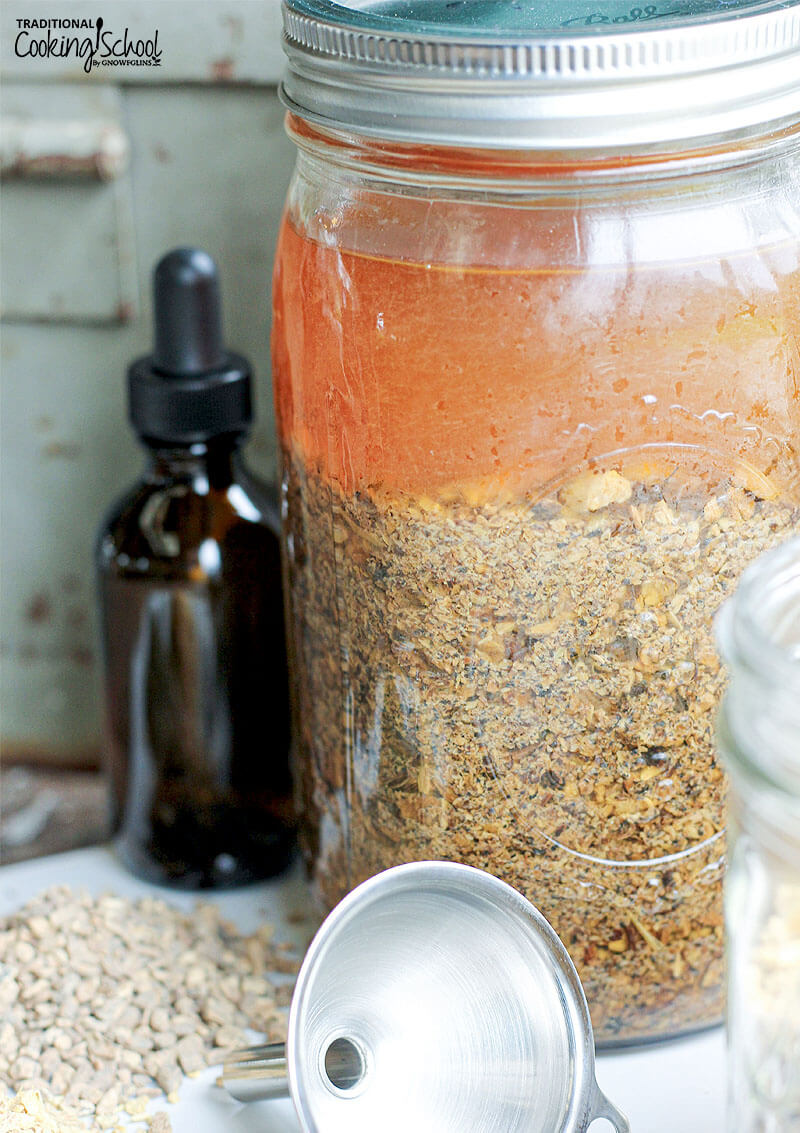
Want more on this topic?
Check out Wardee’s excellent article and video on the topic of How & Why To Use Digestive Bitters!
Do you use bitters? What herbs do you like best? Do you have any favorite gas and bloating remedies?
Disclaimer: I’m not a doctor. All information is intended for your general knowledge only and is not a substitute for medical advice or treatment for specific medical conditions. You are responsible for your own health and for the use of any remedies, treatments, or medications you use at home. Bitters are not recommended if you have gastritis, stomach ulcer, gallbladder disease or kidney disease.
This post was originally published and written by Andrea Sabean on 3/10/17. It was updated and republished on 1/6/20.
...without giving up the foods you love or spending all day in the kitchen!

2 free books:
Eat God's Way
Ditch the Standard American Diet, get healthier & happier, and save money on groceries...
We only recommend products and services we wholeheartedly endorse. This post may contain special links through which we earn a small commission if you make a purchase (though your price is the same).


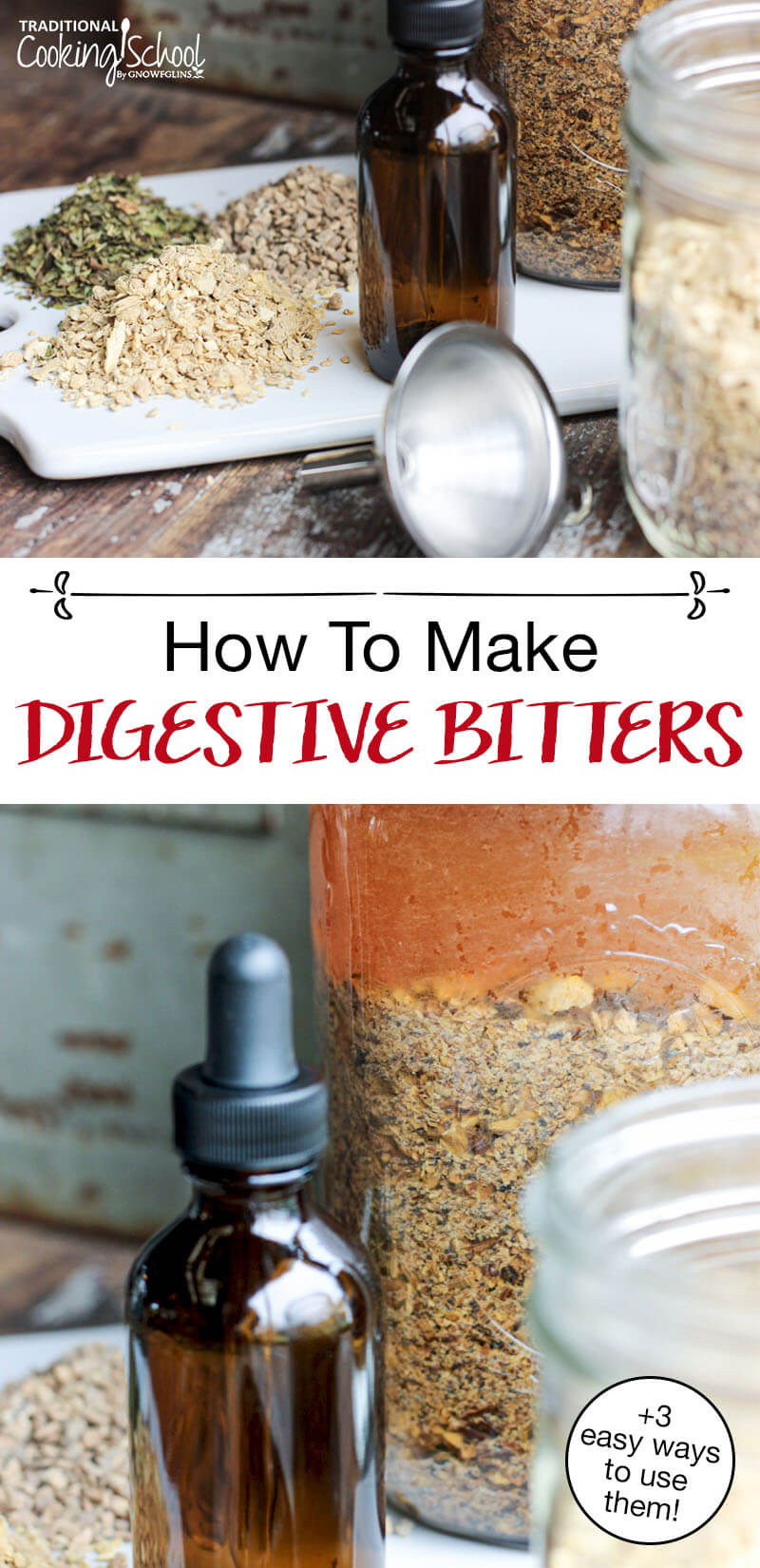
Do you know which of these herbs are safe during pregnancy?
Hi Jessica, There are a large number of herbs that are NOT safe for pregnancy, and even with the more common ones, such as chamomile, there seems to be disagreement as to whether they are safe, or how much is safe. The best thing would be to work with a health practitioner, as they would know which herbs and which dose would be safe for you. Eating bitter salad greens as part of a salad should be a safe way to start until you know for sure.
I’ve been intrigued by bitters for a while now. I think I might give making my own a try!
Megan Stevens says that if you have had gallbladder surgery to remove your gallbladder, you should not take bitters. Do you find this to be true as well? My regular doctor told me to take bitters as I was adjusting to life without a gallbladder, as that’s what had helped her after her gallbladder surgery. I just recently watched Meg’s YouTube video about additions to the GAPS diet, where she mentions bitters. This is where she answers a person’s question about not having a gallbladder, where she says that they are not appropriate for someone without a gallbladder.
Hi Melissa, I did not come across any information one way or the other about bitters and gallbladder surgery, although many of the herbs are meant to stimulate the gallbladder. A natural health practitioner would know for sure what, if any, herbs were safe for you.
Hi Melissa! I apologize for having said that. I need to go watch that video and perhaps remove it from YouTube, so I’m not sharing misleading information. The fact is that digestive bitters still stimulate the liver, even if the gall bladder is no longer there to hold and release the bile that is produced. Go with what your doctor said. 😉 Andrea also mentions ginger. It, in particular, is a wonderful option for those without a gall bladder. Again, so sorry to have caused you confusion!
I had my gallbladder removed years ago and bitters are a tremendous help for my digestion
I have never heard NOT to take bitters if u dont have a gallbladder! Like, wow. I dont think i believe that.
Do you remember the rationale behind that statement?
Can you use apple cider vinegar instead of vodka.
Hi Elizabeth, You certainly can tincture in apple cider vinegar instead of vodka. I have recently read, however, that vinegar tinctures are not as potent as alcohol-based tinctures and they do not last as long, so maybe make a smaller batch. If you are going to use a mason jar for tincturing, put a piece of parchment paper over the jar before putting on the lid as vinegar causes the metal lids to rust.
This is an unusual related question about detoxing after many years of cigarette smoking, my dad and mom quit. If you are aware of any herbal remedies it would be best awesome.
Hi Virginia, Congrats to your parents for quitting smoking!! This is not an area I have researched. Have you thought of consulting with an herbalist or naturopath? They would be able to make specific suggestions for your parents. In general terms, garlic, ginger, dandelion, red clover, stinging nettle, and burdock are all easy-to-find herbs that can be used to remove toxins from the body, but there may be others that are more particular to detoxing the body after smoking. Make sure they are drinking lots of water too, in order to flush toxins out of their body.
Thank you, I haven’t contacted one yet, but that’s a great start! Appreciate your suggestions!
Are the bitter tinctures a safe choice if you have had the gallbladder removed?
Please check out the responses to Melissa S.’s comment above, as she was wondering the same thing.
I recommended that a friend take a cup of dandelion tea once a day to help with her digestion problems, but then she pointed out to me that the side of the box said something to the effect of, “Do not use or drink dandelion tea if you have ever had your gallbladder removed or have had a blockage in either your gallbladder or your bile duct (liver and gallbladder).” I was surprised to see that!
Making my own BITTERS? Now why did i never think of that?? Duh! Thanx for the idea 🙂
I’ve been taking a store bought digestive bitters blend for many years and was thinking about trying other brands. Honestly I’d like to just make my own but can’t seem to find anyone who has an herbal blend already made which I could buy and add my vodka to. I’ve made other tinctures this way and it’s very easy to do. The store bought bitters are VERY expensive. Can you help direct me to anyone selling a bitters herbal blend? Thanks!
Hi Marci,
We don’t know of anyone selling a bitters herbal blend. You’ll likely have to put your own blend together from individual herbs. Sorry!
~ Millie, TCS Customer Success Team
Is it okay to take digestive bitters with a little bit of water mixed together? I just think it’s too bitter.
Hi Elizabeth,
You can add an ounce or so of water when taking your bitters. 🙂
~ Millie, TCS Customer Success Team
Hi there, was wondering if digestive butters can be made of honey, water or other liquids. For religions reasons I can’t use vodka or other alcoholic liquids and I can’t take vinegar.
I have created my own mixtures using honey, but what about water or any other type of liquid you came across that can be used and doesn’t contain any alcohol.
Thank you for the great website.
Love and peace ?
Hi Meyza,
You could use a food grade vegetable glycerin.
Amazon has several non-alcoholic bitters if you prefer to purchase.
Hope this helps! ~ Vicki, TCS Customer Success Team
I had my gallbladder removed years ago and bitters are a tremendous help for my digestion
Hi Andrea,
Your article is great and very informative! Thanks for writing it.
My nutritionist recommended that I add bitters as part of my everyday diet. She recommended I use Urban Moonshine brand.
While I understand its benefits, I find them to be very expensive. So I am keen to make my own. The herbs I have on hand are fennel, cardamom, ginger, cloves and cinnamon. Can I use fennel as the main ingredient and use one of more of the rest as supplementary ones? If so, what would be the right way to do it? Could I soak it in water overnight and consume the water the next day before meals? Would that serve the purpose?
Any help will be greatly appreciated.
Thanks.
Hi, Andrea.
Yes, you can use fennel. In #2 above there’s a link that will show you how to make an infusion.
~Danielle, TCS Customer Success Team
Do you think the bitterest herbs powdered in a tea can fix digestion for someone with visible food pieces in stool? I have spent the passed year with horrible digestive problems and autoimmune disease. Im limited to a very small group of foods as everything comes out almost completely undigested with exception to a few foods. I also suffer from malabsorption and various nutrient deficiencies
Hi, Christopher.
Although we can’t give medical advice, bitters seem like a good thing to try. 🙂
Be sure to work with your doctor.
~Danielle, TCS Customer Success Team
What’s the biggest difference between using digestive enzymes versus bitters?
I have a question about a comment you listed.
“Bitters also change the stomach’s pH, which stimulates the gall bladder to release bile into the duodenum (the upper part of the small intestine). Bile helps to break down fats”.
I’ve had my gallbladder out.
Hi Deborah, digestive bitters are still beneficial as they stimulate the liver. You can ask your doctor about taking other digestive aids in addition to bitters, if you aren’t already, such as ox bile.
Many years ago I couldn’t digest and was given pills with ox bile in which I thought was gross, but they worked brilliantly. If I could find again I would take again. If you can find them go with it. Best of luck.
Choleretics work best on the liver, the liver drips bile continuously, this is all the bile you get if you don’t gave a gallbladder. The gall bladder squirts concentrated bile when you eat fatty food, so no gallbladder then you don’t get the concentrated release of bile. So back to herbal bitters, if you have no gallbladder use choleretic herbs along with some warming herbs like angelicaarchangelica, fennel seeds, you can also use cholergogues as they still help but I would definitely make sure you have some choleretic herbs in the mix, add a moistening herb too like licorice or marshmellow root too so the formula isn’t just drying herbs which many are. Use this info and do a further bit of research on choleretic, cholergogue and demulcent herbs and you’ll be on the correct path to a good bitters . Hope this helps for people who dont have a gallbladder.
Thank you so much! This is exactly the info I was searching for to get started!
Can you use essential oils of your suggested bitters with the same effects?
What about Arugula? Is it a bitter? And if so, what would the potential properties be for healing the body. I have an abundance and we like it in a salad (a little), and I am in process of creating tincture of them. I am thinking it is good for digestion and the liver. Interested to hear your perspective. Thanks
Yes eat it before your main heavy or fatty meal, it’s bitter so it will help
I use Swedish Bitters in the winter. I am intrigued by the thought of making my own.
Hi there great advice, was going to try to make something similar to Malört or Jäegermeister for sipping after a big meal. Would consuming 1-2oz of your version be too intense?
Probably, try it and see how it makes you feel, also depends what abv of alcohol you’ve used.